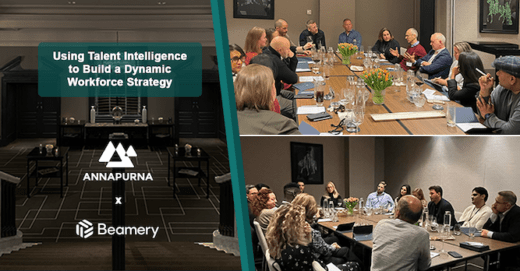A gap is growing between the evolving talent demands of businesses and the ability of many HR functions to meet it. And that is raising some significant questions about the future of the ‘people’ profession.
But before we open that particular can of worms, let’s take a step back and review why this is such an important issue for senior leaders.
Klaus Schwab, CEO and Chairman of the World Economic Forum has pointed out that in the digital age:
“Talent, more than capital, will represent the critical production factor. For this reason, scarcity of a skilled workforce rather than the availability of financial capital is more likely to be the crippling limit to innovation, competitiveness and growth.”
You already know this. CEOs and their executive teams know this. Boards, private equity, venture capitalists and institutional investors know this. While the development of new business models to deal with the digital age remains vital, getting, keeping and motivating talent remains the number one concern.
Which is why every CEO worth his or her salt has refocussed on their talent agendas. Lawrence Bossidy, ex CEO of Honeywell said “Nothing we do is more important than hiring people. At the end of the day, you bet on people, not strategies.” Sir Richard Branson of Virgin weighed in with “Train people well enough so they can leave. Treat them well enough so they don’t have to.” Brian Chesky, CEO of AirBnB added “You gotta build a team that is so talented, they almost make you feel uncomfortable.” Well quite.
In other words, people are kinda, sorta, maybe, just a little bit, the most important thing leaders should focus on! Which positions HR and the wider ‘people industry’ at the very heart of commercial decision-making. Again, you all already knew that.
However, what doesn’t seem to be fully appreciated is how much work, the workforce and the workplace have already fundamentally changed in the last ten years. While we busy ourselves fielding those ‘Future of Work’ emails (three this week already!), we tend to ignore the huge changes that have already (and continue to) completely reshape the world of talent.
It almost seems like HR is still waiting for the future to arrive when it’s already wiped its feet on the doormat, pulled up a chair and is methodically working its way through the last of the custard creams.
If this all sounds a bit alarmist, let me try to paint a picture. AI and automation are already redefining work (e.g. smart factories and robotic process automation) and the workforce (e.g. self-serve supermarket checkouts, chatbots and news anchors). New workplace models such as shared workspace (WeWork) and collaboration software (Slack) have already changed where and how work is delivered.
The expectation economy is redefining the value of human capital (check out Matthew Syed’s latest book Rebel Ideas), while changing workforce characteristics (e.g. Generation Y and Z) are reshaping talent supply. Technology has enabled the re-birth of the independent workforce and the new talent supply models that support it (e.g. Upwork, CloudFactory, Topcoder). Evolving worker aspirations are redefining employment relationships, as talent seeks shared cultural, social and environmental values and increased purpose and meaning (witness Google and Microsoft being forced by employees to ditch their military contracts).
So it follows therefore that with all that has already changed, approaches to human capital management (HCM) must have adapted with it. HR functions must have rapidly evolved to keep up with the macro forces that have completely reshaped the world of talent, right?
Hmmmmmmmmm…….
With some notable exceptions like Mattel, Square and Netflix, it seems many HR functions have hardly changed at all.
A look at most job descriptions suggests many recruitment teams continue to screen candidates based upon their ability to repeat the past, when it is their potential to create the future that matters. Many continue to ignore candidate experience for the majority of applicants, when the age of sharing has made reputation management utterly essential. They continue to focus inwards, incrementally improving the same processes, managing the same sales pipelines and measuring success through the same transactional ‘butts-in-seats’, when the world outside has fundamentally transformed talent markets, the commercial value of people and their expectations of work.
Even though businesses activities need to accelerate to cope with shorter production lifecycles and customer demand for constant innovation, many HR functions remain fixated with rules and compliance, developing ever more prescriptive people processes to prioritise risk management. Detailed and convoluted workflows and hierarchies are maintained and reinforced, even though organisations need to be much more agile to exploit fast-moving opportunities or defend against new threats.
Even though talent aspirations have completely transformed, with workers taking active ownership of their careers to gain access to more meaningful, satisfying and profitable work (and avoid convoluted and rigid pecking orders), work still seems to be managed through detailed instruction and supervision, with workers governed by top-down ‘command and control’ leadership approaches that expect and demand passive obedience.
Performance is often managed through secretive, infrequent, one-size-fits all approaches where employees are instructed to conform to defined behaviours and values, fixing themselves to ‘fit in’, even though talent expects to share values and purpose, wants constant feedback as well as continuous opportunities for personal development.
I could go on (and often do) but the point is that unless organisations quickly and thoroughly update their approaches to human capital, they will become dangerously exposed by the traditional approaches to talent acquisition, management and motivation that remain rooted in the past.
Future talent supply will not accept the old ways of doing things. They have already taken a look at their parents and the high stress, dysfunctional relationships they have with their employers and refuse to do the same.
Executives will not accept the old ways of doing things. With their growing enlightenment, they already expect their HR functions to play a key business role, not just a functional one, helping to unlock the real potential of their workforce. They know reactive service, administration and transactional support is nowhere near enough.
Investors will not accept the old ways of doing things. They already know that the success of their investments is closely tied to the quality, engagement and agility of the workforce and their ability to create the products and services that customers want to buy again and again. They know their portfolios increasingly depend on HR leading, not following.
HR is at a crossroads. Carry on doing what they’ve always done, squeezing out ever-diminishing returns from the same old thinking, approaches, tools, and infrastructures.
Or embrace the disruption and evolve to become the HR teams their businesses, their employees and their owners need them to be. Anything less, and their future starts to look an awful lot like those custard creams…




